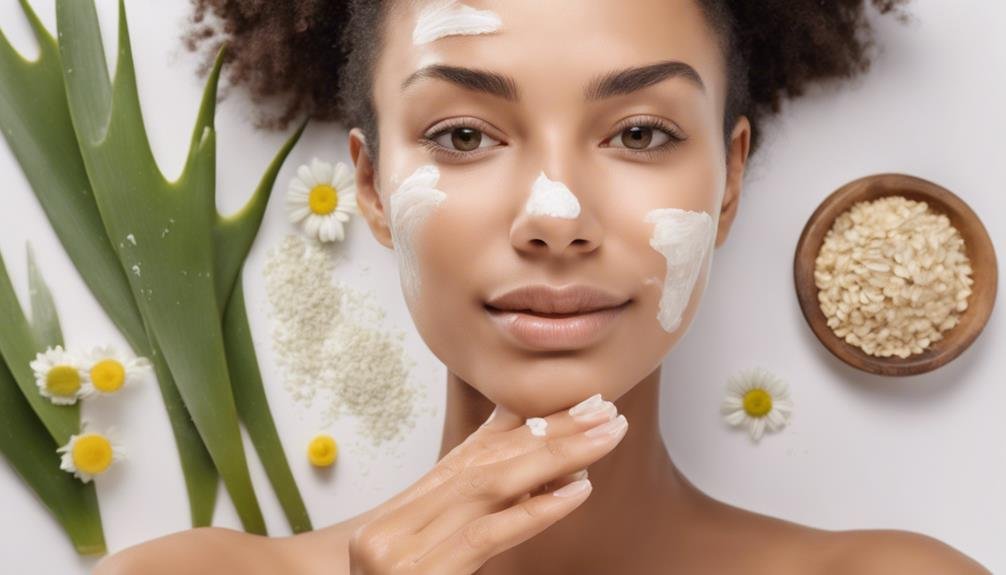"Cherishing Little Steps - A Haven for Baby and Family Journeys"
How to Treat and Prevent Skin Redness
When it comes to managing skin redness, taking a proactive approach is key. An effective skincare routine tailored to soothe and protect your skin can make a significant difference. However, there's more to it than just products and ingredients. Understanding the underlying triggers that contribute to redness is crucial in developing a holistic approach to skincare. By addressing both the external and internal factors, you can create a comprehensive strategy that not only tackles redness but also promotes overall skin health.
Identify Triggers
Identifying triggers that contribute to skin redness is crucial for effective treatment and prevention. Skin care plays a significant role in managing redness triggers. One common trigger is sensitivity to certain skincare products or ingredients. Fragrances, alcohol, and harsh chemicals can irritate the skin, leading to redness. It's essential to read labels carefully and opt for gentle, non-comedogenic products.
Environmental factors like extreme temperatures, wind, and pollution can also exacerbate redness. Protecting your skin with a moisturizer containing SPF can help create a barrier against these elements.
Another redness trigger is stress, which can cause inflammation in the body and manifest on your skin. Finding ways to manage stress through practices like meditation or exercise can positively impact skin health. Additionally, certain medical conditions like rosacea or eczema can contribute to skin redness. Seeking advice from a dermatologist for a tailored skin care routine can help address these underlying issues.
Gentle Cleansing Routine
Establishing a gentle cleansing routine is essential for managing skin redness and maintaining a healthy complexion. When dealing with skin redness, it's crucial to protect the skin barrier, which acts as a shield against external aggressors. Opt for a mild, fragrance-free cleanser that won't strip your skin of its natural oils. Harsh cleansers can disrupt the skin barrier, leading to increased redness and irritation.
To maintain the moisture balance of your skin, choose a gentle cleanser that hydrates while removing impurities. Look for ingredients like hyaluronic acid or ceramides that help retain moisture and strengthen the skin barrier.
When cleansing, use lukewarm water instead of hot water, as hot water can further aggravate redness by drying out the skin.
Pat your skin dry with a soft towel after cleansing, instead of rubbing vigorously. This gentle approach helps prevent irritation and maintains the skin's moisture levels.
Hydrate Your Skin

To continue your journey towards managing skin redness and maintaining a healthy complexion, it's important to focus on hydrating your skin effectively. Moisturize regularly to provide your skin with the hydration it needs to stay plump and supple. Choose a gentle, fragrance-free moisturizer that's suited to your skin type, whether it's oily, dry, or sensitive. Look for ingredients like hyaluronic acid or ceramides that help lock in moisture and strengthen your skin's barrier.
In addition to topical hydration, remember to drink water throughout the day to keep your skin hydrated from the inside out. Hydration is essential for your skin's overall health and can help reduce redness and inflammation.
Aim to drink at least eight glasses of water a day and more if you're active or live in a dry climate.
Use Calming Ingredients
When seeking to address skin redness, incorporating products with calming ingredients can be a beneficial strategy. Soothing serums are a popular choice for individuals looking for redness relief. These serums often contain ingredients like aloe vera, chamomile, green tea extract, and niacinamide, known for their anti-inflammatory and calming properties. They work to reduce redness, soothe irritation, and improve overall skin tone.
Consider the following table to help you identify some key calming ingredients to look for in your skincare products:
| Calming Ingredients | Benefits |
|---|---|
| Aloe Vera | Hydrating and soothing properties |
| Chamomile | Anti-inflammatory and calming effects |
| Green Tea Extract | Rich in antioxidants, calms redness |
| Niacinamide | Strengthens skin barrier, reduces redness |
| Licorice Root | Reduces redness and irritation, brightens skin |
Sun Protection

For effective skincare and to combat skin redness, ensuring adequate sun protection is paramount. Sunscreen application is key to shielding your skin from harmful UV rays that can trigger redness and irritation. Opt for a broad-spectrum sunscreen with an SPF of 30 or higher, applying it generously at least 15 minutes before heading outdoors and reapplying every two hours or immediately after sweating or swimming.
In addition to sunscreen, consider incorporating protective clothing into your daily routine. Wearing wide-brimmed hats, long-sleeved shirts, and sunglasses can offer extra defense against sun exposure. Seek shade protection whenever possible, especially during peak sun hours between 10 a.m. and 4 p.m. These simple steps can significantly reduce the risk of skin redness and inflammation caused by UV radiation.
Reduce Stress
Combatting skin redness involves not only external measures but also addressing internal factors such as stress. Stress can trigger skin redness or exacerbate existing conditions. To help reduce stress and improve your skin's health, consider incorporating mindfulness techniques and relaxation exercises into your daily routine.
Mindfulness techniques such as deep breathing, meditation, and yoga can help calm your mind and reduce stress levels, which in turn can have a positive impact on your skin. Taking a few moments each day to practice mindfulness can help you feel more centered and less reactive to stressors that may contribute to skin redness.
Relaxation exercises like progressive muscle relaxation or visualization can also be beneficial in managing stress. These techniques can help relax your body and mind, promoting overall well-being and potentially reducing the likelihood of skin redness flare-ups.
Avoid Harsh Products

To maintain optimal skin health and reduce the likelihood of skin redness flare-ups, it's crucial to be mindful of the products you use on your skin. Harsh products can strip the skin of its natural oils, leading to irritation and redness. Opt for gentle exfoliation to remove dead skin cells without causing inflammation.
Look for products with calming ingredients like aloe vera, chamomile, or oatmeal to soothe and hydrate the skin. Additionally, incorporating soothing masks into your skincare routine can help alleviate redness and promote a more even complexion.
When choosing skincare products, avoid those containing alcohol, fragrances, and harsh chemicals that can exacerbate skin redness. Opt for mild, non-abrasive cleansers and moisturizers that are specifically formulated for sensitive skin. Remember to always patch test new products before applying them to your face to prevent adverse reactions.
Maintain a Healthy Diet
Maintaining a healthy diet plays a crucial role in promoting overall skin health and reducing the occurrence of skin redness. By incorporating nutrient-rich foods and skin-friendly supplements into your daily meals, you can nourish your skin from the inside out. Here are some tips to help you maintain a diet that supports healthy skin:
- Hydrate: Drink plenty of water throughout the day to keep your skin hydrated and plump.
- Include Antioxidants: Consume fruits and vegetables high in antioxidants like berries, spinach, and kale to fight free radicals and reduce inflammation.
- Omega-3 Fatty Acids: Incorporate sources of omega-3s such as salmon, chia seeds, and walnuts to support skin health and reduce redness.
- Probiotics: Include probiotic-rich foods like yogurt, kefir, and sauerkraut to promote a healthy gut, which can positively impact skin conditions.
Additionally, consider adding skin-friendly supplements like collagen peptides or zinc to further support your skin's health and reduce redness. By nourishing your body with these essential nutrients, you can help maintain glowing, healthy skin.
Seek Professional Advice

Considering the effectiveness of maintaining a healthy diet to support your skin's well-being, seeking professional advice can provide additional insights into managing skin redness. Skin sensitivity is a complex issue that may require expert guidance to address effectively. Dermatologists are trained specialists who can offer personalized recommendations tailored to your specific skin condition. Their expertise can help you understand the root causes of your skin redness and provide targeted solutions to alleviate discomfort and improve your skin's overall health.
| Benefits of Seeking Professional Advice |
|---|
| 1. Accurate Diagnosis of Skin Issues |
| 2. Customized Treatment Plans |
| 3. Access to Prescription Medications |
Dermatologist recommendations are invaluable in creating a skincare routine that suits your skin type and addresses redness effectively. By consulting with a professional, you can gain a deeper understanding of your skin's unique needs and receive expert guidance on managing skin redness.
Develop a Skincare Routine
For effective management of skin redness, establishing a tailored skincare routine plays a crucial role in promoting skin health and reducing irritation. To create a skincare routine that targets redness, consider the following tips:
- Product Ingredients: Opt for skincare products with soothing ingredients like aloe vera, green tea extract, or chamomile to calm redness and inflammation.
- Avoid Harsh Ingredients: Steer clear of products containing alcohol, fragrance, or harsh chemicals that can exacerbate redness and irritation.
- Natural Remedies: Incorporate natural remedies like oatmeal masks, cucumber slices, or cold compresses to soothe and reduce redness.
- Consistent Moisturizing: Hydrate your skin regularly with a gentle, fragrance-free moisturizer to maintain skin barrier function and reduce redness.
Frequently Asked Questions
Can Hormonal Changes Cause Skin Redness?
Hormonal changes can indeed cause skin redness. Imbalances in hormones can trigger this reaction. It's essential to manage stress, maintain a healthy diet, and follow a consistent skincare routine to help alleviate skin redness associated with hormonal fluctuations.
How Do Allergies Contribute to Skin Redness?
Allergies can trigger skin redness due to food sensitivities or stress levels. Your body's reaction to allergens can lead to inflammation, flushing, or itching. Identifying and avoiding triggers, managing stress, and seeking medical advice can help alleviate skin redness caused by allergies.
Is Exercise a Trigger for Skin Redness?
When considering exercise routines and workout clothing, it's important to factor in potential triggers for skin redness. Sweat, friction, and certain fabrics can exacerbate redness. Choose moisture-wicking clothing and gentle skincare to minimize irritation.
Can Weather Changes Affect Skin Redness?
Weather changes can impact skin redness due to seasonal shifts and climate sensitivity. A surprising statistic reveals that 70% of individuals experience increased redness during colder months. Understanding these influences can help manage skin reactions effectively.
Are Certain Medications Linked to Skin Redness?
Certain prescription drugs and topical creams can be linked to skin redness. It's essential to consult with your healthcare provider about potential side effects. They can provide guidance on managing redness while benefiting from the medication's intended effects.
Conclusion
In conclusion, by identifying triggers, adopting a gentle cleansing routine, hydrating your skin, using calming ingredients, prioritizing sun protection, avoiding harsh products, maintaining a healthy diet, and seeking professional advice, you can effectively treat and prevent skin redness. With these steps, you can nurture your skin like a delicate flower, ensuring it remains healthy, vibrant, and free from irritation. Remember, consistency is key in achieving a clear and radiant complexion.




